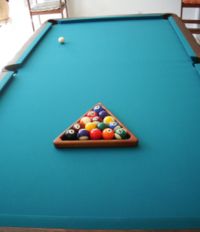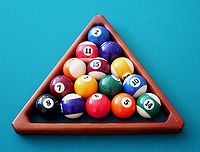- Cribbage (pool)
-
For the card game of the same name, see Cribbage.
 Setting up a game of cribbage with the triangle rack.
Setting up a game of cribbage with the triangle rack.
Cribbage, sometimes called cribbage pocket billiards, cribbage pool, fifteen points and pair pool, is a two-player pocket billiards game that, like its namesake card game, has a scoring system which awards points for pairing groups of balls (rather than playing cards) that total 15. Played on a standard pool table, participants who pocket a ball of a particular number are required to immediately pocket the companion ball that tallies to 15 when added to the prior ball's number. The goal is to score 5 paired cribbages out of a possible 8, with the exception that the last ball, required to be the 15 ball, is not paired but alone counts as 1 cribbage.[1][2]
Contents
Gameplay (Billiard Congress of America)
Set-up
At the start of cribbage, a standard set of fifteen pool balls are racked at the foot end of a pool table, with the apex ball of the rack centered over the foot spot and the 15 ball placed at the rack's center. All other balls are placed randomly except that no two of the three corner balls may total to fifteen.[2] Such an open-ended racking rule is unusual in that most pool games require particular balls to be placed at the corners of the rack and sometimes in fixed positions inside the rack as well. The arrangement thus results in 134,120,448,000 possible racking patterns (14 × 12 × 10 × 2 × 11!).[1][3]
An open break is required in cribbage, meaning that on the break either a ball must be pocketed or at least four balls must be driven to rails (as opposed to a safety break such as used, for example, in straight pool and one-pocket). The object of the game is to score 5 cribbages out of a possible 8 in a full rack of 15 balls.[1][2][4]
Cribbages
A cribbage is a pair of numbered balls which, when added together, total to 15 points. A cribbage only lies where the two partner balls forming the cribbage are each legally made, i.e., where no foul is committed on the same strokes that pocket the balls, or the shot is otherwise deemed illegal. The one exception to pairing is the 15 ball, which itself becomes a cribbage but only once all other object balls of the rack have been pocketed. Thus, not including the 15 ball, the available cribbages are the 1-14, 2-13, 3-12, 4-11, 5-10, 6-9 and 7-8.[1][2][3]
Rules of play
A cribbage only counts when the paired balls are pocketed in succession in the same inning. Where a player pockets a first paired ball and is thus on a cribbage, if the companion ball is not pocketed on the next stroke, the shot is a foul and the unpaired balls of any cribbages not completed are spotted to the foot spot. If the foot spot is occupied, balls are spotted as close as possible to the foot spot on the long string stretching back from the foot spot to the foot rail.[1][2][3]
The penalty for all fouls is the ending of the player's inning; no points are lost, and the incoming player has the option of shooting from position or taking cue ball in hand from the kitchen (behind the table's head string). In older rules a foul was a loss of one point. Three successive fouls in cribbage is a loss of game. Pocketing the 15 ball when it is not the last ball on the table is not a foul. Instead it is immediately spotted and play continues without penalty.[1][2][5][6]
When players pocket more than one ball on a single stroke at any time, a situation often arising on the break shot, they may shoot at any companion balls, but must pocket each in succession in any order. If incidental balls are pocketed on the same stroke that a cribbage is completed, they add to the succession of cribbages the player is "on". When a player fouls by failing to pocket an unpaired cribbage while on a succession of unpaired balls, only unpaired balls are spotted; the prior successful cribbages count toward the score.[2][3]
Normal ball and rail foul rules apply in cribbage. This is a requirement present in most pool games that a player must contact an object ball with the cue ball and after that contact, either pocket an object ball, or some ball including the cue ball must contact a rail. When a foul results from scratching the cue ball into a pocket or jumping it off the table, the player has cue ball in hand from the kitchen. When a player has cue ball in hand from the kitchen and all object balls are also behind the head string in the kitchen, a player has the option of having the object ball nearest the head string relocated to the foot spot. If in this situation two or more object balls are equidistantly closest to the head string, the player may designate which ball is to be relocated.[2][5]
References
- ^ a b c d e f Shamos, Michael Ian (1993). The Illustrated Encyclopedia of Billiards. New York, NY: Lyons & Burford. pp. 56, 63 and 161. ISBN 1-55821-219-1.
- ^ a b c d e f g h BCA Rules Committee (November 1992). Billiards - the Official Rules and Record Book. Iowa City, Iowa: Billiard Congress of America. pp. 120–122. ISBN 1-87849-302-7.
- ^ a b c d Fels, George (2000). Pool Simplified, Somewhat. Mineola, New York: Courier Dover Publications. pp. 88–89. ISBN 0486413683.
- ^ Ewa Mataya Laurance and Thomas C. Shaw (1999). The Complete Idiot's Guide to Pool & Billiards. New York, NY: Alpha Books. pp. 238. ISBN 0-02-862645-1.
- ^ a b Billiard Congress America (1995-2005). General rules of pocket billiards: Rules 3.10, 3.18 and 3.19. Retrieved March 15, 2007.
- ^ BCA Rules Committee (1970). Official Rule Book For All Pocket and Carom Billiard Games. Chicago, Illinois: Billiard Congress of America. pp. 58. ISSN 1047-2444. OCLC 30454628.
Cue sports Pool Nine-ball · Eight-ball · One-pocket · Straight pool · Ten-ball · Bank pool · Blackball · Speed pool · Artistic pool & trick shots · Baseball pocket billiards · Bottle pool · Chicago · Cowboy pool · Cribbage · Golf · Kelly pool · Rotation · Three-ball · more
Carom billiards Three-cushion · Artistic billiards · Five-pins · Balkline & straight rail · Cushion caroms · Four-ball · moreOther games Snooker · English billiards · Russian pyramid · Kaisa · Bumper pool · Bagatelle · Bar billiards · Novuss · Carrom · moreResources Glossary · Techniques · Billiard table · Billiard ball · Billiard hall · Cue stick · Rack · Players · Organizations · Events · CategoriesCategories:- Pool (cue sports)
Wikimedia Foundation. 2010.

